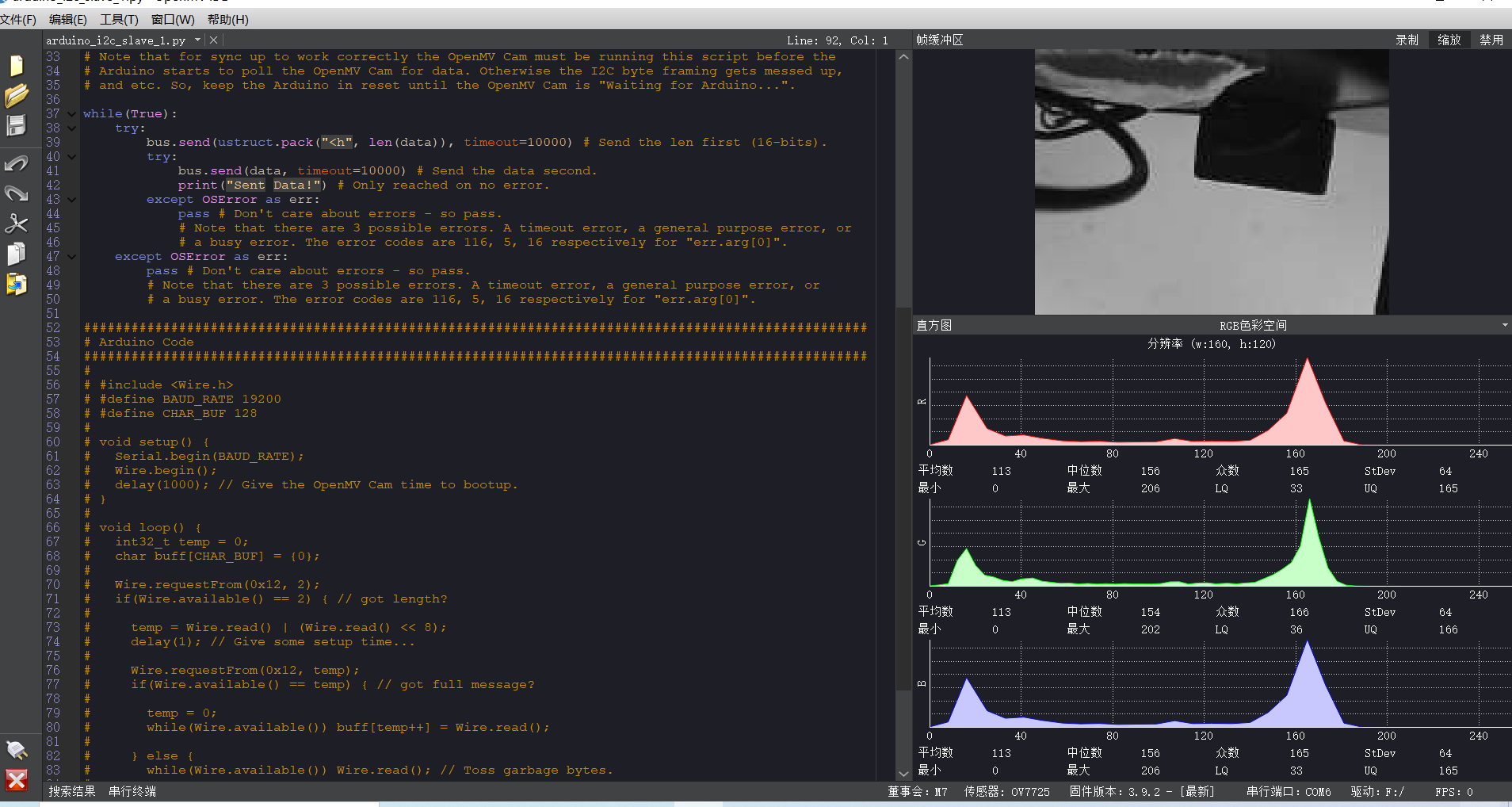# I2C with the Arduino as the master device and the OpenMV Cam as the slave.
#
# Please wire up your OpenMV Cam to your Arduino like this:
#
# OpenMV Cam Master I2C Data (P5) - Arduino Uno Data (A4)
# OpenMV Cam Master I2C Clock (P4) - Arduino Uno Clock (A5)
# OpenMV Cam Ground - Arduino Ground
import pyb, ustruct
text = "Hello World!\n"
data = ustruct.pack("<%ds" % len(text), text)
# Use "ustruct" to build data packets to send.
# "<" puts the data in the struct in little endian order.
# "%ds" puts a string in the data stream. E.g. "13s" for "Hello World!\n" (13 chars).
# See https://docs.python.org/3/library/struct.html
# READ ME!!!
#
# Please understand that when your OpenMV Cam is not the I2C master it may miss responding to
# sending data as a I2C slave no matter if you call "i2c.send()" in an interupt callback or in the
# main loop below. When this happens the Arduino will get a NAK and have to try reading from the
# OpenMV Cam again. Note that both the Arduino and OpenMV Cam I2C drivers are not good at getting
# unstuck after encountering any I2C errors. On the OpenMV Cam and Arduino you can recover by
# de-initing and then re-initing the I2C peripherals.
# The hardware I2C bus for your OpenMV Cam is always I2C bus 2.
bus = pyb.I2C(2, pyb.I2C.SLAVE, addr=0x12)
bus.deinit() # Fully reset I2C device...
bus = pyb.I2C(2, pyb.I2C.SLAVE, addr=0x12)
print("Waiting for Arduino...")
# Note that for sync up to work correctly the OpenMV Cam must be running this script before the
# Arduino starts to poll the OpenMV Cam for data. Otherwise the I2C byte framing gets messed up,
# and etc. So, keep the Arduino in reset until the OpenMV Cam is "Waiting for Arduino...".
while(True):
try:
bus.send(ustruct.pack("<h", len(data)), timeout=10000) # Send the len first (16-bits).
try:
bus.send(data, timeout=10000) # Send the data second.
print("Sent Data!") # Only reached on no error.
except OSError as err:
pass # Don't care about errors - so pass.
# Note that there are 3 possible errors. A timeout error, a general purpose error, or
# a busy error. The error codes are 116, 5, 16 respectively for "err.arg[0]".
except OSError as err:
pass # Don't care about errors - so pass.
# Note that there are 3 possible errors. A timeout error, a general purpose error, or
# a busy error. The error codes are 116, 5, 16 respectively for "err.arg[0]".
###################################################################################################
# Arduino Code
###################################################################################################
#
# #include <Wire.h>
# #define BAUD_RATE 19200
# #define CHAR_BUF 128
#
# void setup() {
# Serial.begin(BAUD_RATE);
# Wire.begin();
# delay(1000); // Give the OpenMV Cam time to bootup.
# }
#
# void loop() {
# int32_t temp = 0;
# char buff[CHAR_BUF] = {0};
#
# Wire.requestFrom(0x12, 2);
# if(Wire.available() == 2) { // got length?
#
# temp = Wire.read() | (Wire.read() << 8);
# delay(1); // Give some setup time...
#
# Wire.requestFrom(0x12, temp);
# if(Wire.available() == temp) { // got full message?
#
# temp = 0;
# while(Wire.available()) buff[temp++] = Wire.read();
#
# } else {
# while(Wire.available()) Wire.read(); // Toss garbage bytes.
# }
# } else {
# while(Wire.available()) Wire.read(); // Toss garbage bytes.
# }
#
# Serial.print(buff);
# delay(1); // Don't loop to quickly.
# }

